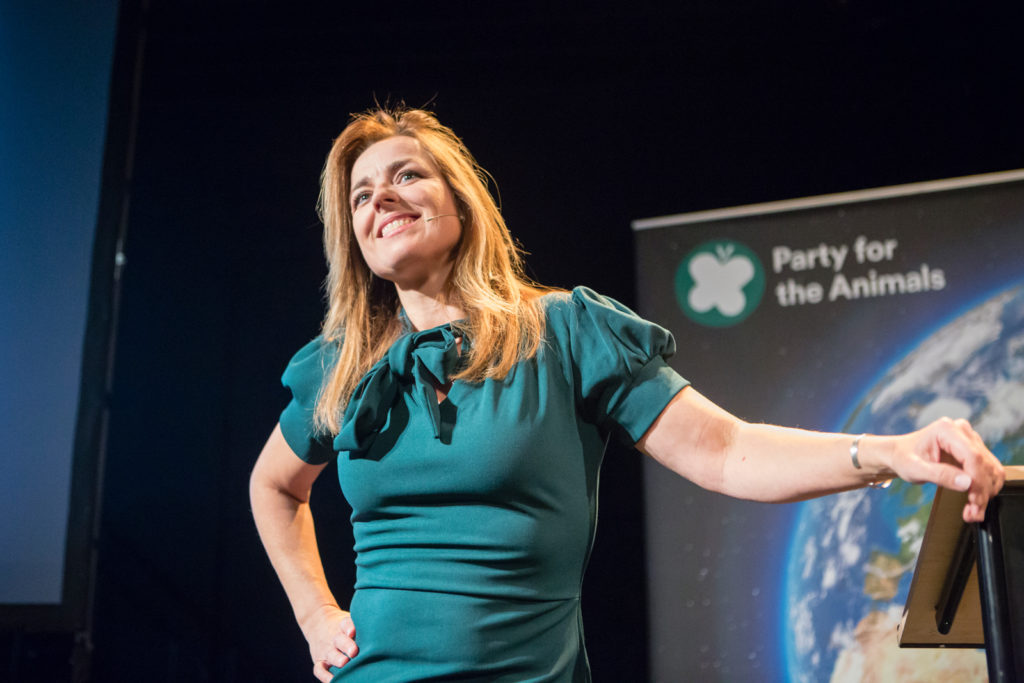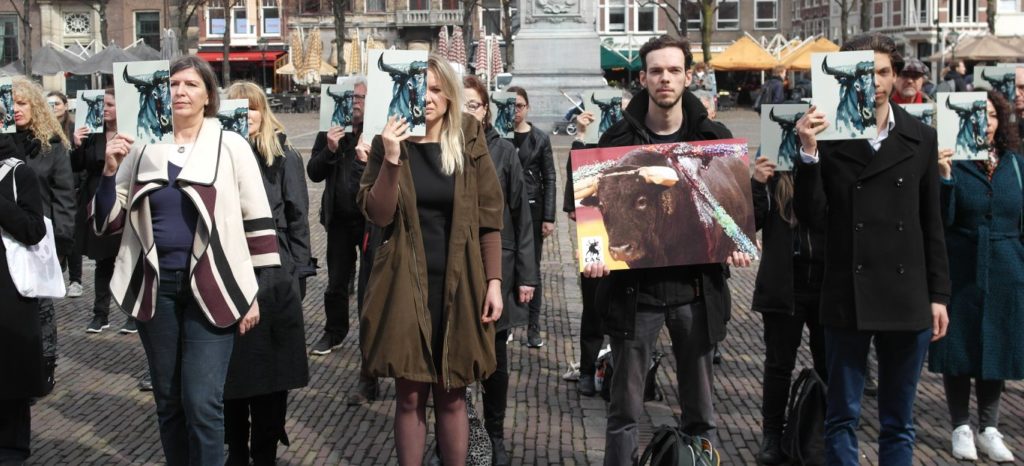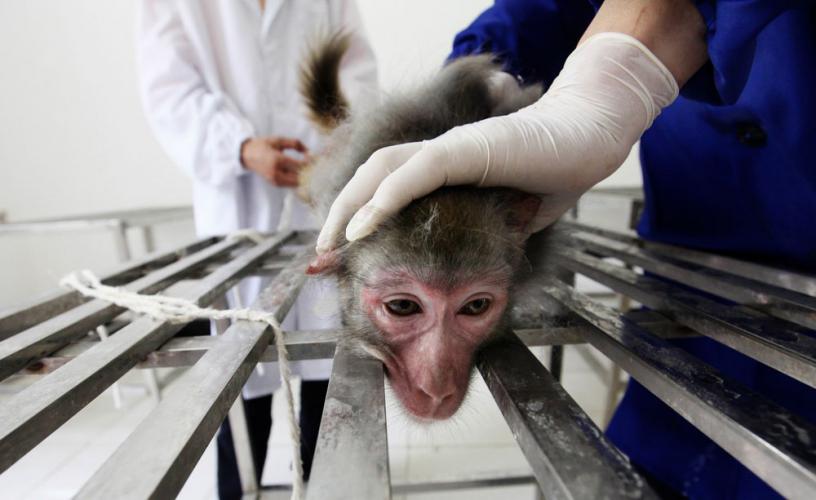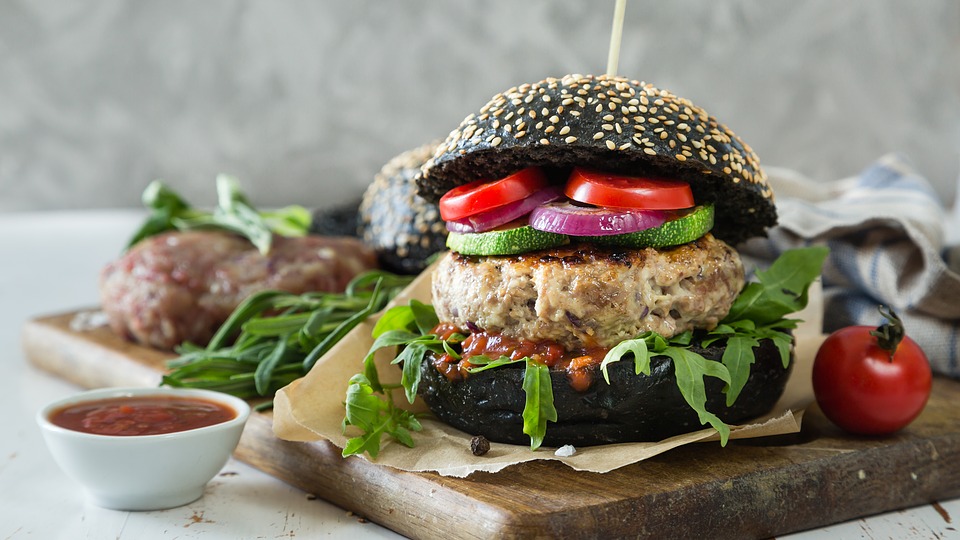Worldlog Marianne Thieme 1. svibnja 2018
The 22nd of April was International Earth Day. On that day, people all over the world reflect on all the beauty of the earth. Such a day demonstrates well that the problems surrounding nature, environment and climate change are transboundary and that we should collaborate to tackle these problems. I see that such awareness is growing, wherever I go. Just recently, I was in Sweden and Germany to give lectures. I was invited to Sweden by our sister party Djurens parti and to Germany by a theological university. The lecture in Germany was attended by visitors from Georgia, Hungary, the Czech Republic and Ghana among others. It’s wonderful to see that increasingly more people from different backgrounds are demanding a different kind of politics: politics focussed on sustainability and compassion instead of economic growth.

Marianne during her lecture in Sweden
Together we are in strong position: This is also demonstrated by the fight against bullfighting. Thanks to an international campaign conducted by CAS International, the European Parliament decided in 2015 that the European Union must stop its subsidies for bullfighting. The Dutch Lower House already accepted our motion to stop those subsidies in 2013. The European Commission has, however, ignored the wish of the European Parliament for years. But the EU subsidy policy is currently being reviewed, so there’s a chance again that the European Commission will decide not to invest any more money in the bullfighting industry. On the 4th of April, CAS International protested against the current European subsidies, opposite the Lower House, and our MEP Anja Hazekamp attended this protest, together with our member of the Lower House, Femke Merel Arissen. You, as a citizen, can also help to pressure European policy makers: sign the petition against the European subsidies for bullfighting here !

Femke Merel and Anja Hazekamp of the Party for the Animals at the protest against subsidies for bullfighting
The 24th of April was World Lab Animals Day. Worldwide, the number of animals that are used in animal testing is estimated at 115 million every year, of which 12 million animals are used in Europe. The Netherlands even has the largest Primate Testing Lab of Europe, the BPRC. 1500 monkeys are used there in gruesome experiments. Some monkeys get electrodes placed in their heads while others are made ill with the most horrifying diseases. We have drawn attention to what’s happening to those monkeys but also to the millions of other animals that are pointlessly used as testing animals all over the world. The Dutch government has said before that the Netherlands must be frontrunner in research without animal testing. So, it’s odd that an institute such as BPRC is still open.
Certainly, in these times of quick innovations and technological developments, there are sufficient alternatives for animal testing, but our governments refuse to invest enough money into them. We keep pressuring the government and the EU to stop the cruelties in the animal testing industry!

Experiments on monkeys
Almost half of all grains and vegetable proteins that are grown all over the world are fed to farming animals. What a waste of farming land, water and food that humans could eat directly. Our huge meat consumption is decadent. Even the most mainstream institutes and companies are now aware of this. The authoritative institute the World Food Organisation already sounded the alarm bell because the livestock industry poses a threat to our food security, nature and the environment. This month, the Council for the Living Environment and Infrastructure (an important advisory council of the Dutch government) adopted an urgent advice: the livestock industry must be considerably decreased to be able to achieve the Paris climate objectives and consumers must make their contributions too by consuming less meat and dairy products.

Vegan burger
But despite this scientific advice of its own advisory council, the Dutch government is hiding its head in the sand again and is ignoring the advice. The government’s intense lobbying this month even achieved that Dutch veal meat can be exported to China again. One of the most climate-, environmentally and animal-unfriendly measures a government can take. But fortunately, we see that others do dare to contribute to a positive change for humankind, animals and the environment. Increasingly more companies and educational institutes aim at local, organic and vegetable products. Read here the article of The Guardian about how veganism is becoming more mainstream.
Until the next time!
Marianne
22. travnja bio je Međunarodni dan Zemlje. Toga dana ljudi širom svijeta razmišljaju o svim ljepotama zemlje. Takav dan jasno pokazuje da su problemi oko prirode, okoliša i klimatskih promjena prekogranični i da moramo surađivati kako bismo im se mogli suočiti. Vidim da ta svijest raste sve više, kamo god idem. Nedavno sam bila u Švedskoj i Njemačkoj da održim predavanje. U Švedskoj sam bila na pozivu od naše sestrinske stranke Djurens parti i u Njemačkoj na poziv teološkog sveučilišta. Predavanje u Njemačkoj uključivalo je posjetitelje iz Gruzije, Mađarske, Češke i Gane. Divno je vidjeti da sve više ljudi iz različitih sredina zahtijevaju drugačiju vrstu politike: politiku usmjerenu na održivost i suosjećanje, umjesto gospodarskog rasta.

Marianne tijekom predavanja u Švedskoj
Zajedno smo jaći: to također pokazuje borba protiv borbi s bikovima. Zahvaljujući međunarodnoj kampanji koju vodi CAS International, Europski parlament odlučio je 2015. godine da Europska unija treba prestati odobravati subvencije za borbe s bikovima. Već u 2013. i nizozemski Zastupnički dom je usvojio naš prijedlog za zaustavljanje tih subvencija. Međutim, Europska komisija godinama je ignorirala želju Europskog parlamenta. No, politika subvencija EU-a je trenutno na pregledu, što je opet moguće da će Europska komisija odlučiti da sad stvarno više nema novca za ulaganje u borbe s bikovima. Dana 4. travnja je CAS International prosvjedovao ispred parlamenta u Hagu protiv trenutnih europskih subvencija i naša MEP Anja Hazekamp prisustvovala je u ovom prosvjedu, s našom članicom Zastupničkog doma Femke Merel Arissen. I ti kao građanin možeš pomoći vršiti pritisak nad europskim političarima: potpiši ovdje molbu protiv europskih subvencija koje idu za borbe s bikovima!

Femke Merel i Anja Hazekamp iz Stranke za životinje u znak protesta protiv subvencija za borbe s bikovima
Dana 24. travnja bio je Svjetski dan pokusnih životinja. U svijetu, broj životinja korištenih za testiranje procjenjuje se na 115 milijuna, od čega 12 milijuna u Europi. Nizozemska čak ima najveći test centar s majmunima u Europi, BPRC. Tu se u groznim pokusima koristi 1500 majmuna. Jedni dobivaju elektrode u glavu a drugi strašne bolesti. Mi smo upozorili na stanje tih majmuna, ali i na milijune drugih životinja u svijetu koje se besmisleno koriste kao pokusne životinje. Vlada je još ranije rekla da do 2025 želi prednjačiti u istragama bez pokusa na životinjama. U tom slučaju se naravno ne može objasniti da još uvijek postoji institucija poput BPRC-a.
Pogotovo u ovom vremenu brzih inovacija i tehnološkog razvoja postoji dovoljno alternativa za testiranje na životinjama, ali naše vlade odbijaju uložiti dovoljno novca. I dalje vršimo pritisak na vladu i EU da se ukinu zlodjela industrije testiranja na životinjama!

Eksperimenti na majmunima
Gotovo polovica svih žitarica i biljnih bjelančevina uzgojenih u svijetu daju se farmerskim životinjama. Kakav gubitak poljoprivrednog zemljišta, vode i hrane koju ljudi mogu izravno iskoristiti! Naša ogromna potrošnja mesa je stoga dekadentna. To prodire u većine glavnih agencija i tvrtki. Autoritativni institut svjetske organizacije za hranu (FTO) već je oglasio alarm jer industrijsko stočarstvo predstavlja veliku prijetnju za našu sigurnost hrane, prirode i okoliša. Ovaj mjesec je i Vijeće za zaštitu okoliša i infrastrukture (važno savjetodavno tijelo nizozemske vlade) iznijelo hitnu preporuku: gomila stoke se mora znatno smanjiti za postizanje klimatskih ciljeva Pariza i potrošači trebaju doprinijeti i jesti manje mesa i mliječnih proizvoda.

Veganski burger
Unatoč tomu znanstvenom savjetu iz vlastitog savjetodavnog vijeća, nizozemska vlada ponovno stavlja glavu u pijesak i odbacuje savjete. S intenzivnim lobiranjem ovog mjeseca vlada je čak uvjerila da se nizozemska teletina može ponovo izvoziti natrag u Kinu. Jedna od najvećih klimatskih, ekoloških i životinjskih neprijateljskih mjera koje vlada može poduzeti. Srećom, vidimo da se drugi usuđuju pridonijeti pozitivnoj promjeni za ljude, životinje i okoliš. Sve više tvrtki i obrazovnih institucija fokusiraju se na lokalne, organske i biljne proizvode. Pročitaj ovdje članak iz The Guardian kako veganstvo postaje sve više mainstream.
Do sljedećeg puta!
Marianne